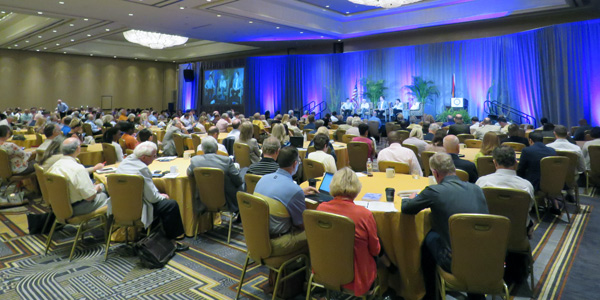By Rich Heidorn Jr.
SCOTTSDALE, Ariz. — State regulators were forced to scramble the programming at their summer meeting last week when Department of Energy officials belatedly rejected invitations to talk about the Trump administration’s proposed coal and nuclear bailouts.
The National Association of Regulatory Utility Commissioners invited officials from DOE’s Office of Fossil Energy and Office of Nuclear Energy to speak on a panel July 17 on Trump’s directive to subsidize at-risk nuclear and coal generators (“When the President Says You Can’t Retire: The Impacts of Section 202c on the Electricity Industry”) but neither office was represented.
In addition, Assistant Energy Secretary Bruce J. Walker, who was scheduled to speak at the Summer Policy Summit’s General Session on July 16, instead appeared at the Fairmont Scottsdale Princess hotel ballroom on a screen via a recorded cellphone video.
Walker, appointed by President Trump last year as head of the Office of Electricity, said he was unable to attend because of “weather problems in New York.” DOE said Walker was scheduled to fly from New York to Phoenix via Denver but missed his connecting flight because of delays at LaGuardia Airport and was unable to reschedule to arrive at the conference in time.
The Maryland Public Service Commission told RTO Insider that DOE’s nuclear energy representative canceled the day before the panel discussion.
“We received an email on Monday, July 16 from DOE’s Office of Nuclear Energy that they would be unable to send a representative to speak at the joint subcommittee panel on July 17 due to scheduling conflicts,” Amanda Best, an aide to Maryland Commissioner Anthony O’Donnell, who was to moderate the session, said in an email. “A representative from the DOE Office of Fossil Energy was also unable to attend.”
DOE’s absence led some NARUC attendees to speculate that the department wanted to avoid questioning by regulators and reporters about its plans for implementing Trump’s directive.
DOE spokeswoman Shaylyn Hynes didn’t deny it.
“There is an interagency policy review process underway regarding grid resilience and examining multiple policy options,” she said in a statement. “It would have been premature for DOE representatives to discuss the specifics of that process while it remains ongoing.”
Walker angered members of the House Committee on Science, Space, and Technology’s Subcommittee on Energy last month when he testified that his agency had no estimates on the cost of the bailouts, which Trump had ordered a week earlier. Walker responded to Democratic members’ questions tersely and without elaboration. (See Dems Hit Coal, Nuke Bailout at House Hearing.)
Walker’s name has been among those floated as a potential replacement for FERC Commissioner Robert Powelson, an outspoken opponent of the bailouts, who is resigning in mid-August to become CEO of the National Association of Water Companies. (See related story, FERC Says Farewell to Powelson.)
At the conference, however, NARUC members passed a resolution asking that Trump appoint a replacement with state regulatory experience. “No one understands better than state commissioners the real-world, often unintended, effects of federal policy at the ground level on consumers, and how such policies complement, interfere or interact with related state programs or local/regional market conditions/demographics,” the regulators said.
Powelson, former chairman of the Pennsylvania Public Utility Commission, is the only former state regulator on FERC.
Quicker Recovery for Cyber Investments
Walker spoke for less than four minutes on the video, reading from notes while sitting in what looked like an airport corridor.
“What I wanted to speak about directly was the need for all of us within the regulatory framework to acknowledge the changes that are necessary in the general rate case filings so that they better adapt to and address the problems we see today,” he said. “Specifically, in the cybersecurity world, the investments that are being made today become obsolete within six months. Our regulatory models today don’t necessarily recognize that, and one of the things we collectively need to do is — using a risk-based approach process — properly align the rate case mechanisms and the recovery aspects for the utilities that we work with so that they can properly recover their investments.”
NARUC passed a resolution at the summer meeting encouraging regulators to “explore and examine alternative rate recovery mechanisms to accelerate the modernization, replacement and enhancement of the nation’s electric system.”
Carl Pechman, director of the National Regulatory Research Institute, NARUC’s research arm, said Walker’s “concerns about the rate treatment of cyber activities is real.”
“In light of these issues, the NRRI is planning to undertake a survey and deep dive on the ratemaking of assets that have short and difficult-to-predict asset lives,” Pechman said in an email. “We look forward to working with our nation’s public utility commissions and the U.S. DOE to help assure that cost recovery and rate mechanisms support national priorities of cybersecurity.”
“Regulators should and mostly do have discretion with regard to the treatment of capital and operating costs, including consideration of risk and obsolescence, and the alignment of cost recovery to useful life,” Janice Beecher, director of Michigan State University’s Institute of Public Utilities, said in an email. “Potential obsolescence within one year raises several issues. The regulatory policy community would benefit from research and information-sharing in this area, given its criticality.”
States’ Role in National Security
Walker said that although national security is generally considered a federal function, states have an important role because they regulate the utilities that power the 16 critical infrastructure sectors.
“We will continue to work through our Electric Sector Coordinating Council and the Oil and Natural Gas [Subsector] Coordinating Council to work with the asset owners to develop short-term executable strategies for cyber, physical and [electromagnetic pulses],” he said.
“The investments we are looking to drive are designed to reduce risk. Thus, as you become aware of investor requests designed to address these three specific areas, I would implore you all to take the threat very seriously and find a way to support the investment.”






